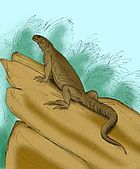| Odaxosaurus Temporal range: Late Cretaceous – Paleocene, 85–55 Ma PreꞒ Ꞓ O S D C P T J K Pg N | |
|---|---|
| Scientific classification | |
| Domain: | Eukaryota |
| Kingdom: | Animalia |
| Phylum: | Chordata |
| Class: | Reptilia |
| Order: | Squamata |
| Family: | Anguidae |
| Genus: | †Odaxosaurus Gilmore, 1928 |
| Species | |
|
†O. piger Gilmore, 1928 (type) | |
Odaxosaurus is an extinct genus of anguid lizards that existed in western North America from the Late Cretaceous to the Paleocene. Fossils of the type species Odaxosaurus piger and the species O. priscus are widespread throughout Late Cretaceous formations in the western United States and Canada. First described in 1928 from the Lance Formation in Wyoming, O. piger has since been found in the Hell Creek Formation in Wyoming and Montana, the Frenchman and Scollard formations in Alberta, and the Aguja Formation in Texas. It was one of the few species of lizards to survive the Cretaceous–Paleogene extinction event, which is estimated to have killed off 83% of all lizard species. The second species, O. priscus, was named in 1996 from the Dinosaur Park Formation in Alberta and has since been found in the Kaiparowits Formation in southern Utah. Remains of an anguid from the Kirtland Formation in New Mexico may also belong to Odaxosaurus.
References
- Longrich, Nicholas R.; Bhullar, Bhart-Anjan S.; Gauthier, Jacques A. (2012). "Mass extinction of lizards and snakes at the Cretaceous–Paleogene boundary". Proceedings of the National Academy of Sciences of the United States of America. 109 (52): 21396–401. Bibcode:2012PNAS..10921396L. doi:10.1073/pnas.1211526110. PMC 3535637. PMID 23236177.
- Nydam, Randall L.; Rowe, Timothy B.; Cifelli, Richard L. (2013). "Lizards and snakes of the Terlingua Local Fauna (late Campanian), Aguja Formation, Texas, with comments on the distribution of paracontemporaneous squamates throughout the Western Interior of North America". Journal of Vertebrate Paleontology. 33 (5): 1081. doi:10.1080/02724634.2013.760467. S2CID 86519841.
This article about a prehistoric lizard is a stub. You can help Misplaced Pages by expanding it. |




